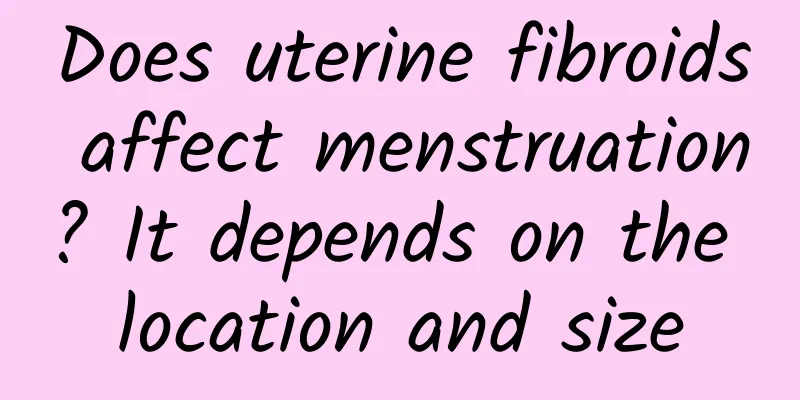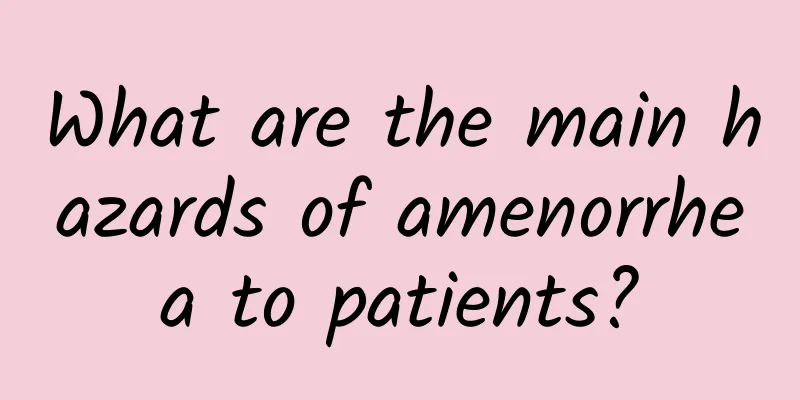Does uterine fibroids affect menstruation? It depends on the location and size

|
Uterine fibroids are one of the most common gynecological diseases. Once you have this disease, the secretions in your vagina will increase significantly. You will feel abdominal discomfort, and sometimes you will have irregular vaginal bleeding. In more serious cases, you will also have back pain. So, does uterine fibroids affect menstruation? 1. Does uterine fibroids affect menstruation? 1. Submucosal fibroids or large myometrial fibroids can affect menstruation The impact on menstruation depends on the location and size of the fibroids. If the growth location is under the mucosa of the endometrium, even if it is very small, it will cause changes in the morphology of the uterine cavity and increase the area of the endometrium, thus affecting normal menstruation and causing excessive menstrual flow or prolonged menstruation. The same is true for uterine fibroids growing in the myometrium, which will increase the area of the endometrium and affect menstruation. The menstrual flow will become more than before, and the menstrual period may also be prolonged. 2. Small myometrial fibroids and subserous fibroids do not affect menstruation If the uterine fibroids grow in the myometrium but are not very large, this situation generally will not affect menstruation. If it is a subserous uterine fibroids, no matter how large the tumor is, it generally will not affect menstruation. There is no need to worry about excessive menstrual flow or prolonged menstruation. 2. What are the effects of uterine fibroids on menstruation? 1. Excessive menstrual flow or prolonged menstrual period If you have uterine fibroids, the area of the endometrium may increase, so a large amount of endometrium will fall off, which will significantly increase the menstrual volume. Some patients may also experience prolonged menstruation. If the menstrual volume is too much for a long time, it is likely to cause anemia, and then cause adverse symptoms such as pale complexion, dizziness, and physical fatigue, which seriously endangers your health. 2. Decreased menstrual flow or amenorrhea If the uterine fibroids are large, they may cause compression to the uterine cavity, which will also affect menstruation. The main consequence is a decrease in menstrual volume. If the condition is too serious, it may directly cause amenorrhea. |
<<: Can I still have children after myomectomy? Most of them do not affect
>>: Can female ovarian cysts be cured? Surgery is necessary
Recommend
Symptoms of benign uterine fibroids How to treat benign uterine fibroids
The severity of uterine fibroids depends on the g...
Experts introduce to you how to prevent cervicitis
Cervicitis is very harmful to women. Everyone sho...
What are the precautions for abortion and what are the methods of abortion?
Abortion can cause great harm to a woman's bo...
What are the types of pelvic inflammatory disease?
Pelvic inflammatory disease has a serious impact ...
Tell you: Who is not suitable for medical abortion?
Now in our lives, many female friends have unexpe...
The representative of Korean actresses who remain ageless! Jun Ji-hyun's charming abdominal muscle development, 10kg weight loss secret in 2 months
Jun Ji-hyun's new drama "Jirisan" i...
What should I pay attention to during miscarriage?
What should I pay attention to during miscarriage...
The dangers of bacterial vaginosis
Vaginitis refers to an inflammatory disease of th...
Common treatments for cervical precancerous lesions
Clinical follow-up observations show that it take...
General measures for treating uterine fibroids
The incidence of uterine fibroids has been increa...
Which hospital is good for treating congenital absence of vagina?
Where is the best hospital for the treatment of c...
How much harm does chronic cervicitis cause to female patients?
Chronic cervicitis is the most common gynecologic...
Eat quinoa instead of rice to lose weight, it became an instant hit! Weight loss doctor: When pursuing high dietary fiber, don’t ignore this landmine
People who have weight loss plans are no stranger...
What are the symptoms of uterine fibroids?
Uterine fibroids are a common disease in women an...
What are the three main causes of cervical erosion?
In recent years, the incidence of cervical erosio...









